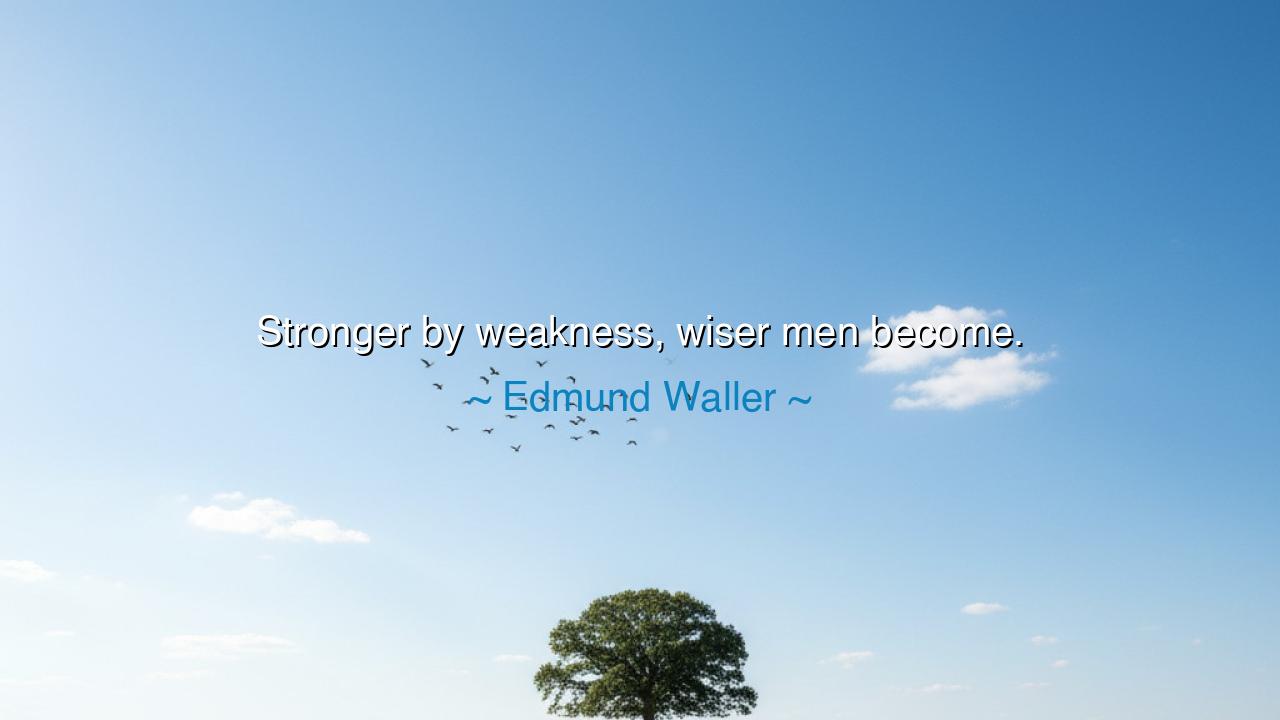
Stronger by weakness, wiser men become.






Hear, O sons and daughters of endurance, the words of Edmund Waller, poet and thinker of ages past: “Stronger by weakness, wiser men become.” In this paradox lies a truth that the proud often overlook—that it is not in triumph alone that man grows mighty, but in struggle, in frailty, and in the wounds that teach humility. For the iron forged in flame is not hardened by ease, but by trial; and the spirit of man is no different.
The meaning of these words rests in the mystery that weakness is not the end of strength, but its beginning. When a man falters, when his pride is broken, when he tastes the bitterness of failure, he is forced to look inward, to reckon with his limits. In that moment, he may despair, or he may rise wiser than before. The man who has never known weakness often grows arrogant, but the man who has endured it grows stronger by weakness, tempered like steel by the fire of adversity.
History is filled with shining examples. Consider the tale of Abraham Lincoln, who knew failure after failure—defeat in elections, loss in business, grief in family—before rising to become one of the greatest leaders of his nation. His wisdom was not born of unbroken victories, but of scars, of lessons carved deep into his soul. His weakness became the soil in which his strength took root, and when the storm of civil war came, he stood unshaken, because he had already been tempered by loss.
Or think of Helen Keller, who entered life with the great weakness of blindness and deafness. Yet through that very weakness, she became a beacon of wisdom and strength to the world. The barriers she faced gave her an insight that few could grasp. Her triumph was not despite her weakness, but through it. She embodied Waller’s truth—that men and women, confronted by their frailties, may rise into wisdom that strength alone could never bestow.
Yet the words also bear warning. For weakness can destroy as easily as it can strengthen. It is not weakness itself that gives power, but the response to it. The man who yields to despair in his frailty is consumed, but the man who endures, who learns, who humbles himself and rises again, becomes greater than before. Thus, weakness is not the enemy but the teacher—harsh, unrelenting, but faithful in its lessons.
The lesson for us is clear: do not curse your weakness, nor hide from it. Face it, and let it carve away your pride. Let it teach you patience, compassion, and resilience. The wounds of today may be the wisdom of tomorrow, and the frailty of the moment may be the foundation of enduring strength. Weakness is the chisel by which life shapes the soul, and the man who embraces it wisely will stand unshaken when others fall.
As for practical action, when you fail, ask not, “Why me?” but “What can this teach me?” When weakness lays you low, do not drown in shame, but let humility lift you into growth. Share your struggles with others, for in vulnerability, bonds are forged. And do not despise the weak, for they may be learning strength unseen, and in their struggle lies wisdom that even kings cannot buy.
Thus, Waller’s words echo across the centuries: “Stronger by weakness, wiser men become.” Let us not flee from the frailties of life, but embrace them as the furnace of our transformation. For in weakness, we are broken, and in being broken, we are remade—stronger, wiser, and more deeply alive.






AAdministratorAdministrator
Welcome, honored guests. Please leave a comment, we will respond soon